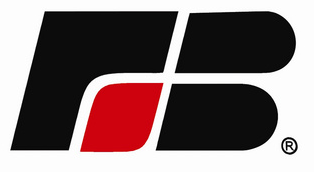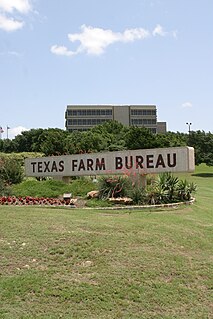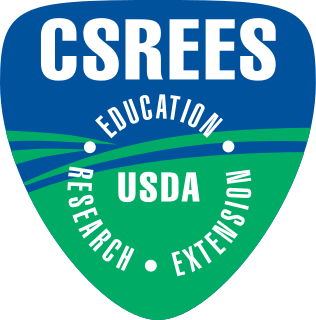
The American Farm Bureau Federation (AFBF), more commonly referred to as Farm Bureau (FB), is an independent, non-governmental, voluntary organization governed by and representing farm and ranch families united for the purpose of analyzing their problems and formulating action to achieve educational improvement, economic opportunity and social advancement and, thereby, to promote the national well-being. Farm Bureau is local, county, state, national and international in its scope and influence and is non-partisan, non-sectarian and non-secret in character. Farm Bureau is the voice of agricultural producers at all levels. AFBF is headquartered in Washington, D.C. There are 50 state affiliates and one in Puerto Rico.
The Commodity Credit Corporation (CCC) is a wholly owned United States government corporation that was created in 1933 to "stabilize, support, and protect farm income and prices". The CCC is authorized to buy, sell, lend, make payments, and engage in other activities for the purpose of increasing production, stabilizing prices, assuring adequate supplies, and facilitating the efficient marketing of agricultural commodities.

The Agricultural Stabilization and Conservation Service (ASCS) was an agency of the United States Department of Agriculture. It administered programs concerning farm products and agricultural conservation. It granted loans to farmers; purchased farm products from farmers and processors; administered land allotment and marketing quota programs; shared the cost of resource conservation and environmental protection measures with farmers and ranchers; and supervised civil defense activities relating to food. It also managed the inventories of the Commodity Credit Corporation. The ASCS was established in 1961.
The Farm Credit System (FCS) in the United States is a nationwide network of borrower-owned lending institutions and specialized service organizations. The Farm Credit System provides more than $304 billion in loans, leases, and related services to farmers, ranchers, rural homeowners, aquatic producers, timber harvesters, agribusinesses, and agricultural and rural utility cooperatives.
Terry Peach is an American farmer and politician from Oklahoma. Peach previously served as the Oklahoma Secretary of Agriculture under Governor of Oklahoma Brad Henry from 2003 to 2011. Peach served concurrently as the Commissioner of Agriculture, having served in that position when he was appointed by Governor Henry in 2003.
A common perception is that the birth of Cooperative Extension followed passage of the Smith-Lever Act of 1914, which provided federal funds to land-grant universities to support Extension work. In a formal sense, this is true. Even so, the roots of Cooperative Extension extend as far back as the late 18th century, following the American Revolution, when affluent farmers first began organizing groups to sponsor educational meetings to disseminate useful farming information. In some cases, these lectures even were delivered by university professors — a practice that foreshadowed Cooperative Extension work more than a century later.
The Farm Credit Council is the national trade association of the Farm Credit System, a U.S. network of borrower-owned cooperative lending institutions and service organizations. The Farm Credit Council represents the Farm Credit System in legislative and regulatory lobbying before the United States Congress government and state legislatures.

The Agriculture Risk Protection Act of 2000 made major revisions to the United States' federal crop insurance program and provided emergency agricultural assistance. The crop insurance provisions significantly increased the program's government subsidy; improved coverage for farmers affected by multiple years of natural disasters; and authorized pilot insurance programs for livestock farmers and growers of other farm commodities that were not served by crop insurance, among many other provisions. The emergency provisions made available a total of $7.14 billion in emergency farm assistance, mostly in direct payments to growers of various commodities to compensate for low farm commodity prices.

The Farm Credit Act of 1971 recodified all previous acts governing the Farm Credit System (FCS), a cooperatively owned government-sponsored enterprise (GSE) that provides credit primarily to farmers and ranchers.
The Sustainable Agriculture Research and Education (SARE)'Program is a US based competitive grants and education program administered through the United States Department of Agriculture’s (USDA) National Institute of Food and Agriculture (NIFA), and run by four regional councils that set policy and make grants. The four regions, North Central, Northeast, South and West, are each guided by a volunteer Administrative Council that sets regional priorities. These councils include farmers and ranchers, representatives from universities, government, agribusiness and nonprofit organizations. Since 1988, SARE has invested around $200 million in more than 5,000 initiatives. New York has had the most funded SARE projects, followed by Pennsylvania, Minnesota, and Wisconsin. Every US state has had at least 10 SARE grants since the program's inception.
Socially disadvantaged farmers and ranchers, for the purposes of USDA outreach and assistance, are defined under the 1990 farm bill as members of a socially disadvantaged group, which is defined to mean those whose identity in a group has subjected them to racial or ethnic prejudice without regard to their individual identity. For the purposes of loan eligibility, Section 355(e) of the Consolidated Farm and Rural Development Act, as amended by P.L. 102-554, Sec. 21(b), adds gender to the definition of a socially disadvantaged group..

A Limited Resource Farmer or Rancher is one of a larger group of “targeted farmers" that also includes beginning farmers and ranchers and socially disadvantaged farmers and ranchers. Limited Resource Farmers are characterized by having limited farm sales and income. The USDA created the Limited Resource Farmer and Rancher program to ensure that these farmers and ranchers can develop economically viable farms, have access to USDA support, and ensure that programs are in alignment with farmer and rancher needs and concerns.
In United States agricultural policy, geographically disadvantaged farmers and ranchers are defined in the 2002 farm bill as a farmer or rancher in an insular area or a state other than one of the 48 contiguous states. This law requires the USDA to submit a report to the U.S. House Committee on Agriculture and the U.S. Senate Committee on Agriculture describing barriers to agricultural production in such regions. The report also outlines means of encouraging and assisting those in such areas to own and operate farms and ranches while participating in USDA agricultural programs.

Marin Organic is a non-profit 501(c)(3) association of organic producers headquartered in Point Reyes Station, California. Founded in 1999 with the goal of creating the first all-organic county, Marin Organic staff and board work with government officials, community groups and organizations, fellow ranchers and farmers to advance the practice of sustainable, organic production. The organization has become an internationally recognized model for building economically viable, community-based local foodsheds.
Arkansas Farm Bureau Federation (ArFB) is a non-profit, grassroots organization dedicated to agricultural advocacy. ArFB represents the interests of farmers and rural communities throughout the state of Arkansas through policy development, lobbying and other programs.

Texas Farm Bureau, the state’s largest farm organization, represents the interests of agricultural producers and rural communities across Texas as the "Voice of Texas Agriculture." Texas Farm Bureau's grassroots structure begins in local communities across the state of Texas. The non-profit organization’s direction and decision making are dictated by its members.

The Louisiana Farm Bureau Federation (LFB) is a state chapter of the United States's largest general farm organization representing farmers, ranchers, and rural residents. The organization provides assistance toward the development and prosperity of Louisiana agriculture. It is a private, non-profit, non-governmental agency established in 1922 to bring a voice to Louisiana farmers and their families. It is based in Baton Rouge, Louisiana.
Florida Certified Organic Growers and Consumers, also known as Florida Organic Growers or FOG, is a non-profit organization founded in 1987. It is classified as a 501(c) corporation. One of the main facets of FOG is Quality Certification Services, a program that extends through 30 states and 14 countries. FOG is also concerned with community outreach and education in order to promote healthy organic lifestyles and social equity.








